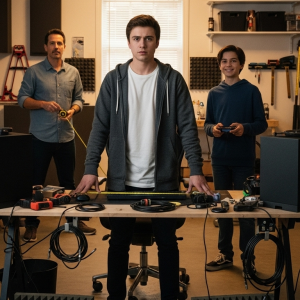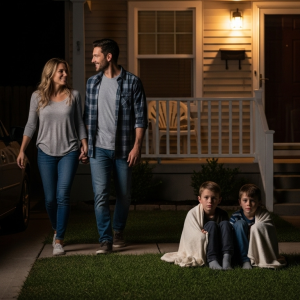My name is Jake, I’m 25, and for my entire life, I’ve lived in the same house, in the same room. This isn’t because I’m some aimless loser; I have a good job as a web developer, I handle all my own bills, and I’m diligently saving to launch my own gaming studio one day. In fact, I’ve been paying my parents $450 a month in rent since the day I turned 18.
Yes, 18. While my friends were navigating college dorms, I was already transferring cash to my parents for the privilege of sleeping in the bedroom I grew up in. At the time, it seemed fair. The housing market here is a nightmare, and I figured helping family was better than lining a random landlord’s pockets. Plus, with my job just a fifteen-minute drive away, it was undeniably convenient.
The problem was never the money. The problem, as it has always been, is my older brother, Drew. At 28, Drew is the walking, breathing embodiment of “golden child syndrome.” My parents have always viewed him as a divine gift, a prodigy just waiting for the world to recognize his genius. Growing up, the double standard was so blatant it was almost comical.
I have a crystal-clear memory from when I was ten. Drew, then thirteen, was trying to throw a football through a tire swing in the backyard. He missed, badly, and the ball shattered the kitchen window. I remember the sound of the glass exploding. My mom rushed out, saw the mess, and then looked at a terrified Drew. She just hugged him. “Oh, honey,” she cooed. “Look at that strong arm! We’ll get that fixed. Don’t you worry.” He was praised.
A week later, I accidentally knocked over a glass of water on the coffee table while reaching for the remote. It resulted in a three-hour lecture from my father about responsibility, the value of property, and my inherent carelessness. That was the blueprint for our lives: Drew’s failures were framed as learning experiences on his grand journey, while my minor mistakes were evidence of deep-seated character flaws.
His journey has been a long one. Drew dropped out of college twice, cycled through at least eight different jobs—getting fired from most—and launched a series of “businesses” that were little more than flimsy online scams. Through it all, my parents were his unwavering cheerleaders. “Drew is just finding his path,” my mom would say. “He’s so entrepreneurial. He just dreams bigger than most people.”
Meanwhile, I was the stable, reliable, and utterly invisible son. My steady job, my monthly rent check, my help around the house—it was all just expected. I was the foundation, and Drew was the masterpiece they were waiting to see completed. I didn’t realize I was also the one expected to pay for the scaffolding.
About a month ago, the masterpiece came home, broken. Drew called my parents in a manufactured panic, crying about how he and his wife, Amy, were “between homes.” This was their code for being broke, irresponsible, and having nowhere else to go.
He arrived at our door with his whole chaotic entourage: Amy, their two children—Zoe, seven, and Tyler, four—and a yappy little Pomeranian puppy named Zeus. His latest venture, a cryptocurrency scheme, had inevitably crashed and burned, leading to their eviction.
My parents didn’t hesitate for a second. “Of course, you can stay here!” my mother exclaimed, hugging him as if he’d returned from war. “Stay as long as you need.” There was no discussion with me, no polite inquiry into whether I was comfortable with four new people and a dog moving in. The circus was simply welcomed into the big top.
The house transformed from a reasonably quiet space into a vortex of chaos overnight. The kids were a whirlwind of noise, screaming and running through the halls from 6 a.m. until 9 p.m. The demon-dog, Zeus, treated the entire house as his personal toilet. He urinated on my shoes, my work backpack, and, in one unforgivable instance, my bed. No one trained him because, as Amy would chirp, “He’s just a puppy!”
My professional life was thrown into disarray. I work from home three days a week and had a meticulously organized setup in the spare room. That room was now filled with Drew and Amy’s overflow of belongings. I was forced to cram my entire workstation into my bedroom, trying to code while my small nephews pounded on the door, demanding to play Roblox on my computer.
Privacy became a forgotten luxury. The single bathroom was always occupied. The kitchen was a perpetual disaster zone, littered with sticky juice boxes and half-eaten snacks. The living room vanished under a blanket of toys and dog hair. My personal belongings began to mysteriously break or disappear—headphones, chargers, a favorite mug. When I’d bring it up, the response was always a dismissive, “The kids are just playing, Jake,” or, “Accidents happen.”
Strangest of all was Drew’s behavior. He became bizarrely territorial and possessive of Amy. Yesterday, I simply asked her if she was done with the toaster. Drew came charging in from the other room, his chest puffed out. “My wife’s got it handled, bro. What’s the issue?” His tone was dripping with aggression, as if I had been hitting on her by inquiring about a kitchen appliance.
And through this entire ordeal, guess who was still faithfully paying his $450 rent? This guy. And guess how much Drew and his family were contributing? If you guessed zero, you’re absolutely correct. I initially held my tongue, telling myself they were going through a hard time. My mom’s mantra, “We have to stand by each other in need,” echoed in my head. I tried to be understanding. But my understanding was about to be stretched to its breaking point.
Last week, my mom cornered me. She came into my room with “the look”—a carefully crafted expression of gentle concern that she only used when she was about to ask for something significant while pretending it was no big deal.
“Jake, honey,” she began, twisting her wedding ring, a nervous habit that always preceded a difficult conversation. “With Drew and his family staying with us, our expenses have really gone up. You know, groceries, utilities, everything…”
I knew exactly where this was going, but I let her continue, watching the performance unfold.
“We were thinking,” she said, avoiding my eyes, “that maybe you could contribute a bit more to help out. Just until Drew gets back on his feet.”
I decided to cut through the pretense. “You want me to pay more rent,” I stated flatly. “While Drew and his entire family are living here for free?”
Her face tightened, a flicker of annoyance breaking through her gentle facade. “It’s not free, Jake. They’re family. And family helps family.” There it was. The magical phrase that was always a one-way street, pointing directly at me.
“So, how much more are we talking about?” I asked, my voice tight.
She finally looked at me, her expression a mixture of hope and entitlement. “Just another $300 a month should cover it.”
The number hung in the air, absurd and insulting. $750 a month. To live in my childhood bedroom, in a house overrun by screaming children and a dog that urinated everywhere. A place where I had no privacy, no peace, and my property was being systematically destroyed. I told her I’d think about it, just to end the conversation. Inside, I was a cauldron of silent rage.
That night at dinner, my dad provided backup. He made pointed comments about “everyone doing their part” and “pulling together in tough times,” all while Drew shoveled food into his face, occasionally mumbling, “Thanks for understanding, bro.”
Then, my mom delivered the finishing touch. “Oh, Drew and Amy are going out for a date night on Friday,” she announced casually. “Jake, you’ll be watching the kids.” It wasn’t a request; it was a decree.
“I have plans,” I said immediately, even though I didn’t.
“What plans?” my mother demanded, as if I, a 25-year-old man, needed her permission to have a social life.
“Just plans.”
Drew jumped in, a whiny, pleading tone in his voice. “Come on, man. We haven’t had a night out in forever. The kids love their Uncle Jake!” Every eye at the table turned to me, the weight of their collective expectation pressing down. I crumbled. “Fine. Whatever.”
Friday night, instead of diving into a new game I’d been anticipating for weeks, I was chasing two hyperactive kids around the house while trying to keep Zeus from destroying the furniture. Drew and Amy promised to be home by 10 p.m. They stumbled in at midnight, both clearly tipsy, offering no apology for their lateness. As a final insult, while I had been distracted getting the kids to bed, Zeus had left a steaming pile of feces in my bedroom. I stepped right in it. A perfect end to a perfect night.
After the babysitting fiasco, I was still wrestling with what to do. Moving out felt like a monumental task. The apartments in my area are outrageously expensive, and every dollar I spent on a deposit and first month’s rent was a dollar taken from my game studio dream. More than that, leaving felt like admitting defeat, like I was letting them win.
But a series of events over the next few days didn’t just push me over the edge; they threw me off the cliff.
The morning after I babysat, I walked into my room to find Amy rummaging through my desk drawers. She wasn’t even being subtle about it. She was just digging through my personal belongings.
I stood there for a second, stunned into silence, before I found my voice. “What are you doing?”
She jumped, her eyes wide with the panic of someone caught in the act. “Oh! I was just… I was looking for some tape. The kids wanted to make a craft.”
“The tape is in the kitchen drawer,” I said, my voice dangerously calm. “Where it has been for the last twenty years.”
“Well, I couldn’t find it there,” she said, her voice sharp and defensive.
Before I could respond, Drew materialized in my doorway, as if he had a sixth sense for when his wife’s questionable behavior was about to be exposed. “Everything cool in here?” he asked, his tone laced with aggression.
“Your wife is going through my stuff,” I said, meeting his gaze.
Drew’s face hardened. “She said she was looking for tape, man. Don’t make it a federal case.”
“It’s my personal space, Drew. Would you like it if I started going through your things?”
“That’s different,” he said, putting a protective arm around Amy. “We’re guests here.”
“Exactly. You’re guests in the house that I help pay for.”
Drew laughed, a short, ugly sound. “It’s always about money with you, isn’t it? Some of us have real problems, dude.”
I almost lost control. I have a personal policy against violence, but he was testing my resolve. I turned and walked out of the room before I said something that would make our strained family dynamic completely implode.
Later that night, I overheard a conversation that erased any remaining doubt I had. I was heading to the kitchen when I heard their voices coming from the living room. They hadn’t seen me.
“Jake has always been so self-centered,” Drew was saying. “Would it kill him to step up and help the family for once?”
Self-centered? I was the one who had been paying rent for seven years while this freeloader had never contributed a single dollar. I was about to storm in and confront them, but my mom’s voice stopped me.
“I know, honey. He just doesn’t understand what it’s like for you, with the kids and everything. But he agreed to pay the extra rent, so that will help.”
What? I never agreed. I explicitly said I would think about it.
“He’s got all that money saved up,” Drew continued, his voice dripping with envy. “Always talking about his stupid video game company. Meanwhile, we can barely afford clothes for the kids.”
Then he lowered his voice to a conspiratorial whisper. “And honestly, he makes Amy uncomfortable. He’s always hanging around when she’s in the kitchen or the living room. She doesn’t like being alone with him.”
I nearly choked. Me making her uncomfortable? She was the one invading my space, and I actively avoided them as much as humanly possible. This was a calculated lie, designed to paint me as a villain and a creep. I retreated to my room, my appetite gone.
The next morning, my mom casually mentioned that since I’d “agreed” to the new rent, she’d be expecting the first payment on Friday. I opened my mouth to protest, but my dad chimed in. “We really appreciate you helping out, son. Family first, right?” It was a coordinated attack. I just nodded, defeated.
But the final straw—the one that truly severed any remaining sense of familial duty—was the headset. I came home from work to find my expensive gaming headset, a $200 piece of equipment, chewed to shreds by Zeus.
When I confronted Drew, he just shrugged. “It’s just a headset, man. He’s a puppy. What do you expect?”
“I expect you to control your dog and replace things he destroys!” I shot back.
“We don’t have money for fancy headsets,” Drew sneered. “If it matters that much, buy another one. Or better yet, grow up and stop playing video games all day.”
That evening, I overheard my mom and Drew talking again. This time, they were discussing my savings account. They were actively brainstorming ways to guilt me into “pitching in” some of my savings to help them through this “rough patch.”
That was it. The absolute limit. They weren’t just taking my present; they were plotting to steal my future. I went to my room, opened my laptop, and started looking for a new place to live.
That night, sleep was impossible. My mind raced, cycling through every frustrating conversation, every entitled demand. At 3 a.m., I sent a text to my old high school friend, Chris. We’d drifted apart but still grabbed beers occasionally.
“Hey man, weird question. You know anyone looking for a roommate? Got to get out of my parents’ place ASAP.”
His reply came instantly. “Dude, this is crazy timing. My roommate is moving in with his girlfriend next month. You serious?”
A wave of relief washed over me. For the first time in weeks, I felt a flicker of hope. I met Chris the next day. His apartment was a basic two-bedroom, but it was clean, quiet, and blessedly free of my family. The rent would be $575 plus utilities—more than my original rent, but significantly less than the $750 my parents now demanded. I took it without a second thought.
Now I had three weeks to orchestrate my escape without triggering a family meltdown. I knew a direct announcement would be met with a barrage of manipulation. So, I initiated Operation GTFO—Get The Freak Out.
It started with stealthy evacuations. Each day, I’d take a small box of non-essential items—old books, winter clothes, spare computer parts—to my car before work. I’d drop them off at Chris’s place during my lunch break. His roommate was a decent guy and didn’t mind the growing stack of boxes in the living room.
The hardest part was maintaining a calm exterior. I had to act normal while every fiber of my being wanted to scream. Drew continued his reign of entitlement, and Zeus nearly blew my cover multiple times, barking his head off whenever I moved a box. I started carrying dog treats in my pocket at all times, feeling like a spy bribing a guard dog.
One afternoon, my seven-year-old niece, Zoe, caught me loading a box into my car. “What’s in the box, Uncle Jake?” she asked, her innocent curiosity sending a jolt of panic through me.
“Just some old stuff I’m donating,” I lied, my heart pounding. Thankfully, her attention span was short, and she ran off to play.
Meanwhile, the pressure from my parents was relentless. My mom would sigh dramatically about bills whenever I walked by. My dad gave me the silent treatment. But the final family meeting was the most surreal.
My mom gathered us in the living room. “We need to discuss the sleeping arrangements,” she announced. “Jake, since you’re working so much, we thought you wouldn’t mind if the kids used your room. You could take the den downstairs.”
The “den” was a windowless, converted storage room in the basement with a decrepit futon. It was a glorified dungeon.
“Absolutely not,” I said, the words escaping before I could stop them.
The room fell silent. They all stared at me, genuinely shocked that I would refuse such a “reasonable” request.
“I think it’s incredibly selfish,” Amy finally said, her voice dripping with venom. “Those poor children are crammed into one room while you have all that space.”
I almost laughed. “You know what’s selfish, Amy? Moving your entire family into someone else’s house and then demanding even more space.”
Drew stood up, getting in my face. “Don’t you talk to my wife like that.”
I stood up too, looking down at him. “Or what, Drew?” He backed down quickly.
Looking at their angry, disappointed faces, I realized that reasoning with them was impossible. They would never change. They would just keep taking until I had nothing left to give. “I’m going to bed,” I announced. “And just to be clear, this discussion is over.”
That night, I texted Chris and asked if I could move in early. He agreed. The final phase of my escape was in motion.
The Friday night before my escape, I acted completely normal. I even did the dishes after dinner, a move that left my mother looking at me with deep suspicion. After everyone was asleep, I packed the last of my essentials. I set my alarm for 5 a.m.
Of course, Zeus nearly foiled the plan. As I began carrying bags to my car in the pre-dawn quiet, the little dog went into a frenzy of barking. Panicked, I had to scoop him up and lock him in the bathroom with a handful of treats. Desperate times called for desperate measures.
Loading my car, my hands shook with a mixture of cold and adrenaline. I took one last look at my empty bedroom. For a fleeting moment, I felt a pang of doubt. Then I heard Drew yell from his room, “Someone shut that dog up!” and the doubt vanished. No regrets.
Driving away as the sun came up was surreal. I didn’t leave a note. What was the point? I cranked up my music and drove toward my new life.
I crashed on Chris’s couch and slept for four hours—the best sleep I’d had in months. When I woke up, my phone had exploded. Eight missed calls from Mom, three from Dad, and a slew of texts that ranged from feigned concern to outright guilt-tripping.
Mom: Jake, where are you? I can’t believe you would do this to us. Dad: Your mother is very upset. Come home so we can talk about this. Drew: Wow, real mature bro. Just bail on everyone.
The guilt-trip express was running right on schedule. I turned my phone off.
That evening, I called my mom. She answered on the first ring, her voice a shriek. “Jake! Where are you?!”
“I moved out, Mom,” I said, keeping my voice steady. “I’m staying with a friend.”
The conversation devolved into her screaming about how I could do this to them, how worried they’d been. The manipulation was thick and suffocating.
“This is about the rent increase, isn’t it?” she accused. “We could have worked something out!”
“I did talk to you,” I said, my patience finally snapping. “Multiple times. You ignored everything I said and kept pushing for more. More money, more space, more sacrifices, all while Drew contributed nothing. I can’t be the only one giving while everyone else just takes.”
She started to cry, her ultimate weapon, but this time, I was immune. I told her I wasn’t coming back and that I would be by to get the rest of my things. She hit me with the classic, “We’re so disappointed in you.”
“The feeling is mutual,” I replied, and hung up
A couple of weeks after I moved, I went back for the last of my belongings. The house felt heavy, drained of all its energy. My mom looked haggard, and my dad was a silent ghost. They didn’t ask me to come back, but the question hung in the air between us.
A week later, my dad called, his voice uncharacteristically humble. “Son, we need to talk, man to man.” Against my better judgment, I agreed to meet him for coffee.
He looked exhausted. He told me my mother was a wreck and that the family was falling apart. Then he got to the real reason for the meeting.
“Jake, we’re in a tight spot. With you gone, we’re short on the mortgage payment this month.”
I just stared at him. “So you want me to keep paying rent for a place I no longer live in?”
“Not rent,” he said quickly. “Just… helping out. Family obligations.”
“What about Drew’s obligations?” I asked. “Why isn’t he stepping up?”
“Drew has a family! He’s going through a tough time!” my dad said, his voice rising.
“He’s been going through a tough time for ten years, Dad. I’m done subsidizing his lifestyle.”
That’s when he dropped the bomb. “We need $800 this month, or we might lose the house.”
The sheer audacity of it made me laugh. It wasn’t my proudest moment, but the request was insane. “No, Dad. Not happening. Drew needs to get a job, and you and Mom need to stop enabling him.”
I left him there, looking utterly defeated. The manipulation didn’t stop. Drew sent a barrage of nasty texts. Amy sent a long, cloying message about how the kids missed me. My aunt called to lecture me about abandoning my parents. They were trying to paint me as the villain to the entire extended family.
But the final, clarifying piece of information came from my cousin, Mark. He had been talking to my mom. It turned out my parents weren’t struggling at all. My dad had received a large bonus at work the month before I left. The “we might lose the house” story was a complete fabrication, a desperate lie to guilt me into giving them more money.
And there was more. The reason they needed cash so badly? They had been secretly helping Drew pay off significant gambling debts. He hadn’t lost his money in crypto; he’d gambled it away.
That was when I went full no-contact. I blocked their numbers, their emails, their social media accounts. The two weeks of blessed silence that followed were the most peaceful I’d had in years.
Mark has kept me updated. Apparently, my parents finally gave Drew an ultimatum: get a job in 30 days or get out. He’s in a full-blown panic. The house is a mess, and the golden child is finally being asked to stand on his own two feet.
As for me, I’ve never been happier. Living with Chris is easy. My room is my sanctuary. Without the constant stress, I’ve been more focused at work and have made real progress on my game development project. I even started dating someone I met at a programming meetup—a woman who is impressed by my ambition, not resentful of it.
If you’re stuck in a similar situation, here’s my advice: cutting toxic people out of your life isn’t a failure; it’s an act of survival. Sometimes, boundaries aren’t enough. Sometimes, you need to build a wall.
I still send birthday cards and Christmas presents to my niece and nephew. They are the innocent victims in all of this. But my relationship with my parents and brother is over. That bridge has been burned, and from the ashes, I’m finally building a life of my own. My dreams no longer have an expiration date.




